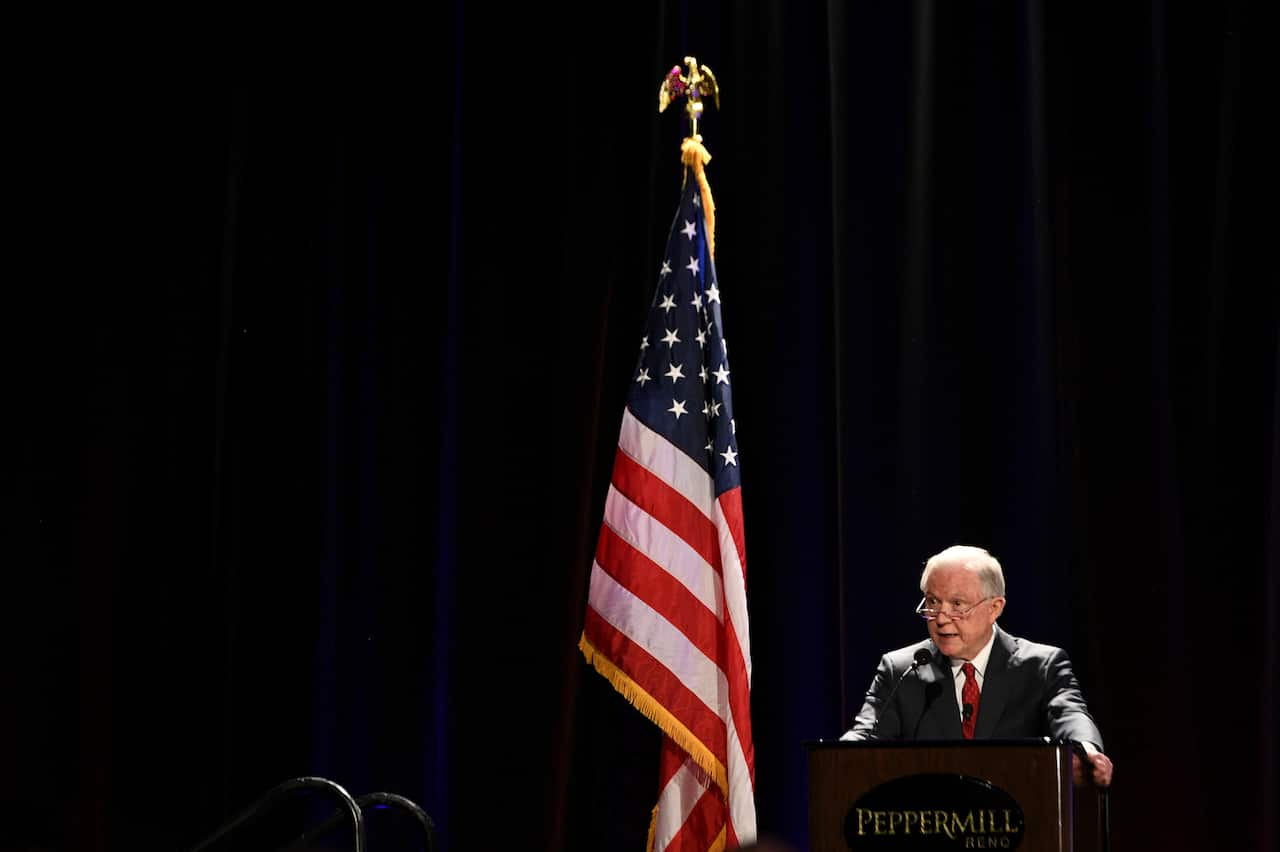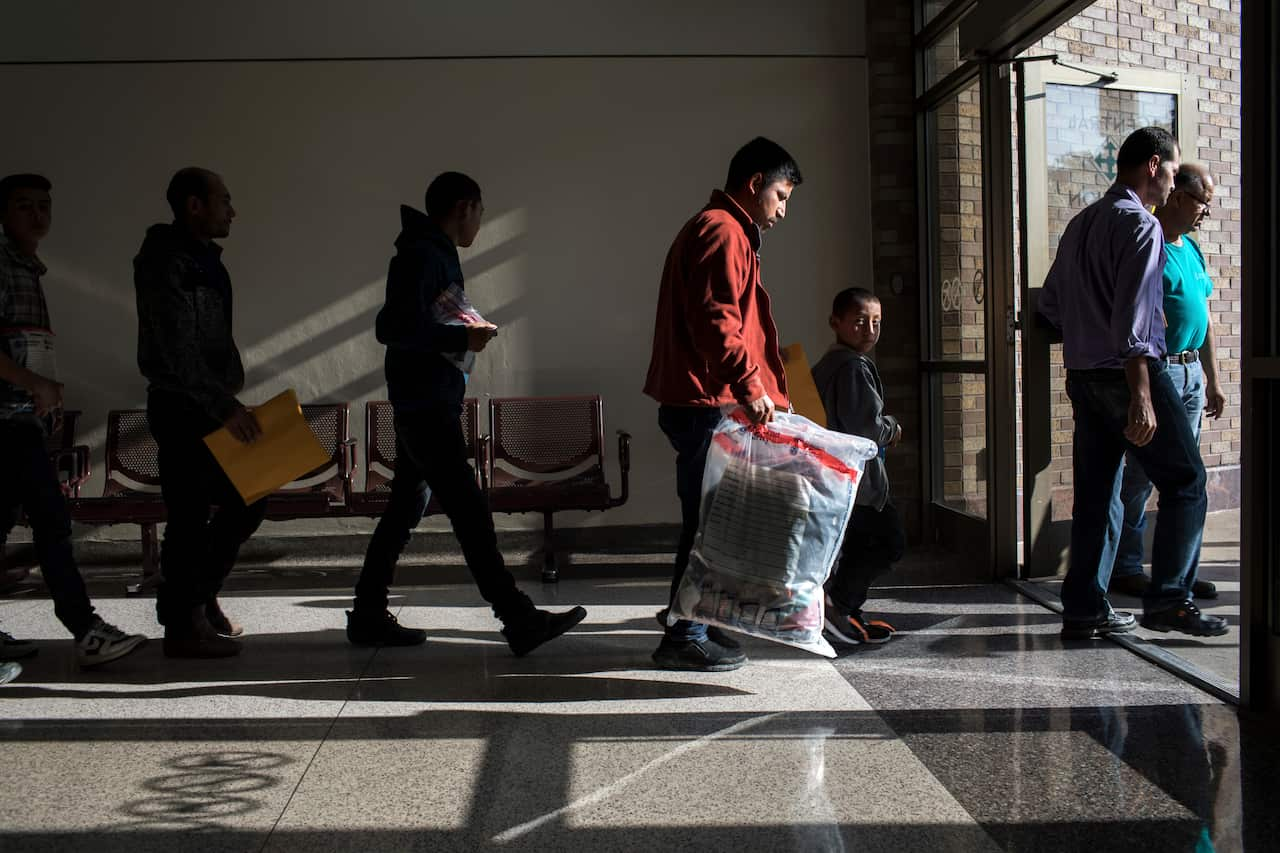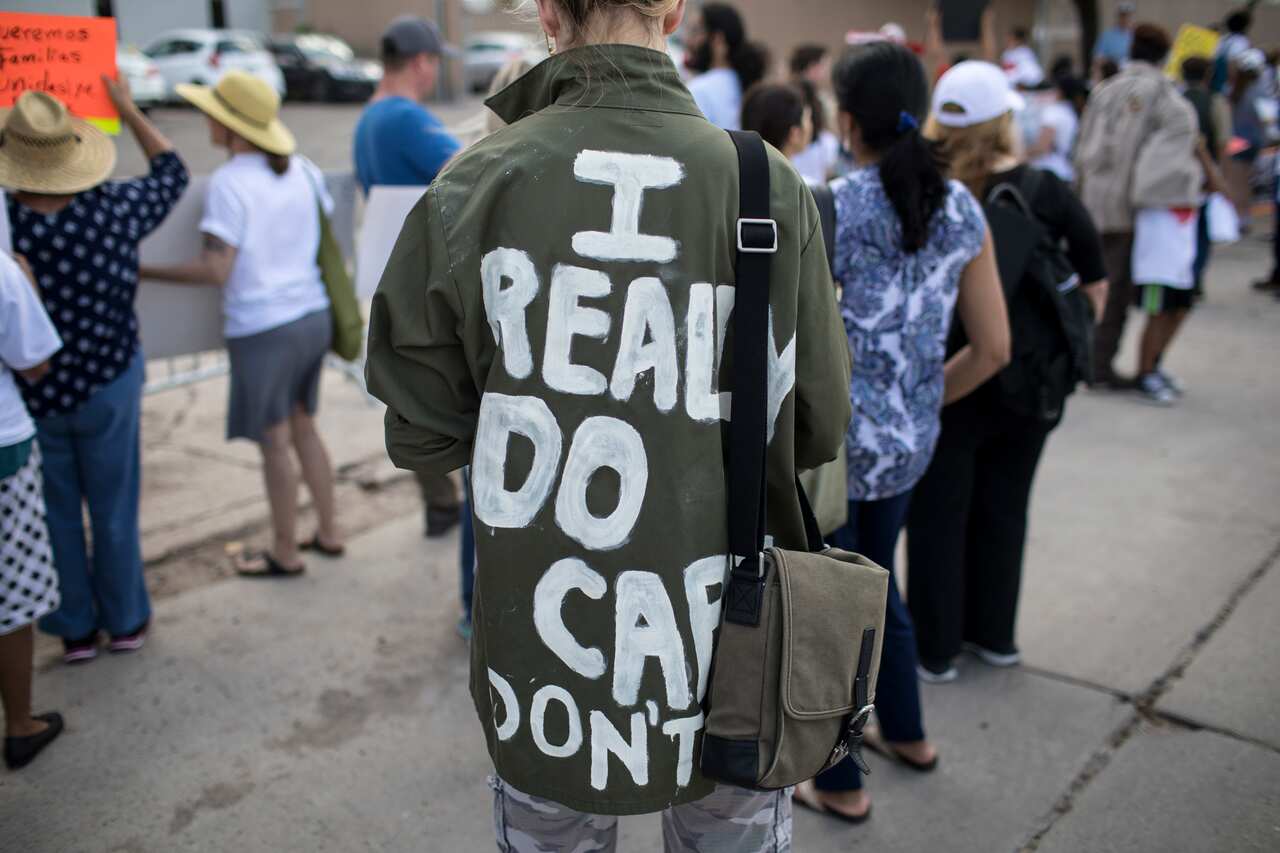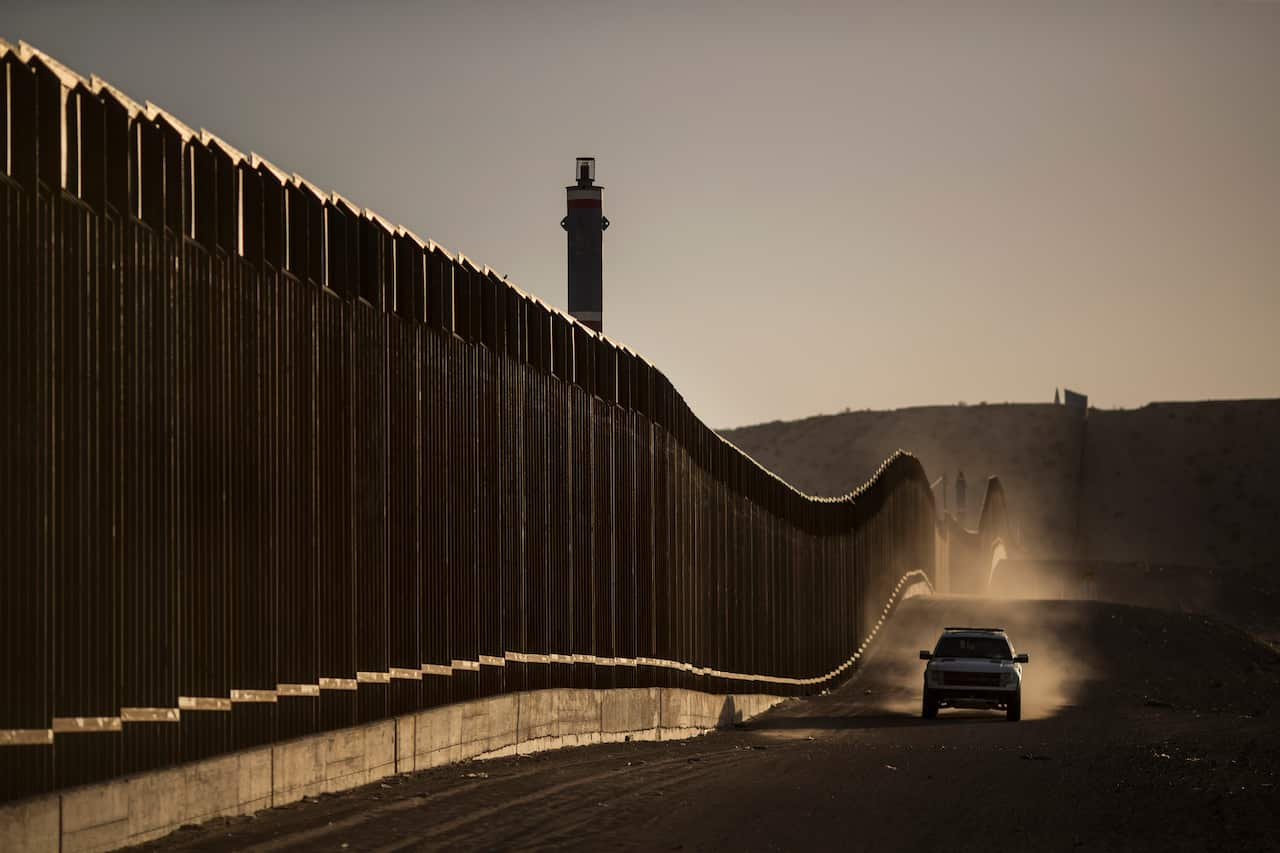The nation’s top border security official said Monday that his agency has temporarily stopped handing over migrant adults who cross the Mexican border with children to prosecutors, undercutting claims by other administration officials that “zero tolerance” for illegal immigration is still in place.
Kevin K. McAleenan, commissioner of Customs and Border Protection, said he had told border agents not to refer families to the Justice Department for prosecution until the two agencies can agree on a policy that would allow parents to be prosecuted without separating them from their children.
Because Immigration and Customs Enforcement does not have enough detention space for the surge of families across the border, the immediate effect of the decision will be that many families will be quickly released, with a promise to return for a court date at some point in the future.

Attorney General Jeff Sessions addresses a crowd at the National Association of School Resource Officers' School Safety and Policing Conference. Source: The New York Times
The decision by McAleenan, conveyed to reporters at a detention centre here, will effectively revive a “catch and release” approach used during the Obama administration for most families crossing the Mexican border illegally. President Donald Trump has repeatedly railed against “catch and release,” saying it invited waves of crime and violence into the United States.
Sarah Huckabee Sanders, the White House press secretary, later echoed McAleenan, saying that while there has been no official change in the “zero tolerance” policy, the reality is that the government does not have the ability to detain all the families coming across the border illegally.
“We’re not changing the policy. We’re simply out of resources,” Sanders said. She blamed Democrats in Congress for not changing immigration laws in ways that would keep migrant families out of the country in the first place.
“We’re working with Congress, hopefully — to provide more resources and the ability to actually enforce the law,” Sanders said, underscoring the practical challenge in making good on the president’s directive.
But even as McAleenan and Sanders addressed the issue, Attorney General Jeff Sessions vowed to continue enforcing Trump’s zero tolerance immigration policy. Sessions told more than 1,000 school resource officers in Reno, Nevada, that refusing to prosecute adults crossing illegally into the United States would be a disservice to the children they bring with them.
“The president has made this clear, we are going to prosecute those adults who came here illegally,” Sessions insisted, though he added that the government will “do everything in our power” to comply with the president’s executive order to avoid separating children from their parents.

Undocumented immigrants walk from a bus station in McAllen, Texas. Source: The New York Times
Sessions and Trump have both ratcheted up their hard-line immigration rhetoric while at the same time promising to keep families together. In brief remarks at the White House on Monday, the president repeated his desire for a system that provides less due process for immigrants.
“We want a system where when people come in illegally, they have to go out — a nice simple system that works,” Trump said, mocking again the idea of hiring more immigration judges. “We want strong borders, and we want no crime.”
Sessions announced the “zero tolerance” policy in early April, telling prosecutors on the southwest border to charge illegal entry offences “to the extent practicable.”
A month later, Sessions announced that the Department of Homeland Security would refer “100 percent of illegal southwest border crossings” for criminal prosecutions - a controversial move that led to the families being separated at the border.
The decision set off weeks of protests, with Democrats and many Republicans calling on Trump to end the policy.
More than 2,000 children remain in the custody of the Office of Refugee Resettlement, an agency within the Department of Health and Human Services. Federal officials are struggling to reunite children with their parents, some of whom have already been deported.

A demonstrator in a jacket referencing one first lady Melania Trump wore on a visit to McAllen, Texas. Source: The New York Times
McAleenan said Monday that 538 children in Border Protection’s custody who were separated since May have been reunited with their parents. Those children were never sent to facilities run by the Health and Human Services Department.
But even before Monday’s announcement by McAleenan, the reality on the ground appeared far less simple than Trump or Sessions envisions.
Administration officials said the zero tolerance policy has been enforced in dramatically different ways, depending on whether border communities have the resources to detain and prosecute new waves of immigrants.
Where there is not enough space to detain families with children, such families are already being charged and quickly let go, with a promise to return for later court hearings.
Casa Alitas is a shelter in Tucson, Arizona, that takes in migrant families once US officials have released them into the country as their cases proceed. On Monday, Teresa Cavendish, who runs the shelter, said that government officials appear to be releasing many families into the United States together as a unit, rather than keeping them in detention — even when the families cross at unauthorised border points.
“These current families are very, very lucky,” she said.
At the towering federal courthouse in Tucson, the cases of dozens of recent border crossers were underway Monday just as the Trump administration announced that it would halt the prosecution of people who enter with children.
In the hallway, Victoria Trull, 36, a defence attorney for several of the migrants, described the whiplash of the last few weeks: first, a spike in prosecutions of adult border crossers, then the sudden appearance of adult border crossers who said they’d been split from their children, then the Trump administration announcement that adults would no longer be split from children, then the suggestion that people might be sent back without trial.
“It’s a little bit scary,” she said.
Prosecutions of adults crossing the Mexican border without children continued Monday unabated. And administration officials said that it was possible that legal cases against adults arriving at the border with children could resume once facilities to hold the families become available.

A Border Patrol vehicle drives along the border fence in Sunland Park, N.M., across from Ciudad Juarez, Mexico, June 24, 2018. Source: The New York Times
Defence officials said Monday that the Pentagon is preparing to build temporary housing for migrants at two military bases that could serve that purpose.
Defence Secretary Jim Mattis, who is on his way to China, told reporters travelling with him that details are still being worked out. But other Defence officials said that the two bases that will house migrants’ children and possibly their families, are Fort Bliss, which is headquartered in El Paso, and Goodfellow Air Force Base near San Angelo, Texas.
There remained confusion over exactly who would be housed at the bases. One Defence official said that migrant families with adults who would be charged with crimes would be housed at Fort Bliss, while unaccompanied children would be housed at Goodfellow. But the Pentagon had not officially said exactly who would be housed where, and Mattis said that details are still being worked out.
Democratic lawmakers continued to lash out at the president’s border policy, describing the prospect of migrant camps on military bases as akin to internment camps.
After visiting the border, two Democratic senators, Tom Udall of New Mexico and Richard Blumenthal of Connecticut, faulted the Trump administration for lacking any apparent strategy to reunite children with their parents following the president’s executive order last week.
On a conference call with reporters, Udall said Trump “should go see for himself the crisis and chaos he has created.” Federal agencies, the senator said, “aren’t communicating with each other or with Congress about how they’re going to fix this.”
“We’ve seen no plan,” Udall said. “I think there’s a sense in the White House that if you sign something and hold it up before the American people, that it’s going to happen by magic.”
The senators said Congress should hold hearings in order to provide needed oversight. “This nation is heading for a train wreck at the border — a moral and legal train wreck, and already a humanitarian train wreck,” Blumenthal said.
But Trump was defiant, saying that Democrats should support efforts to secure the border against immigrants who are criminals or give false reasons for wanting to be in the United States.
“The Democrats want open borders and they don’t care about crime, and they don’t care about our military,” Trump said.
Sessions, who was greeted in Reno by hundreds of protesters outside of his speech venue, received a standing ovation from school safety officers in the audience before and after he spoke.
In addition to fiercely defending the administration’s “zero tolerance” policy, the attorney general emphasised the increase in the number of children who are sent across the border by themselves, currently more than 80 percent, often with a paid smuggler.
Those children, Sessions said, are often targeted by drug cartels, recruited by gangs and fall into a life of drug addiction and crime. Sessions said that in March, Customs and Border Protection agents apprehended five juveniles who were allegedly smuggling 35 pounds of fentanyl.
“The compassionate thing to do is to protect our children from drugs and violence, to put criminals in jails, and secure our borders, have an immigration system that has integrity, and consistency, that is right, and just and moral,” he said.
“The alternative is open borders, which is both radical and dangerous, and is not a realistic prospect for America.”
Share


